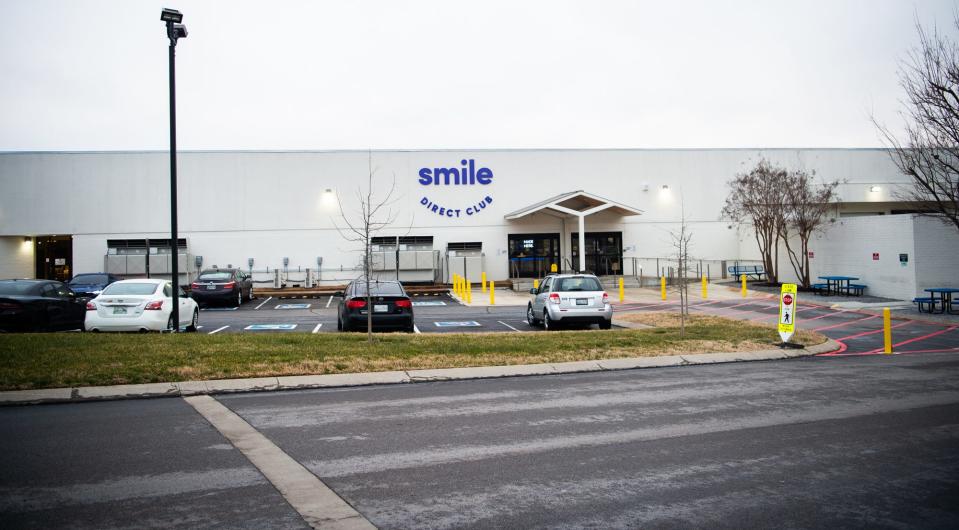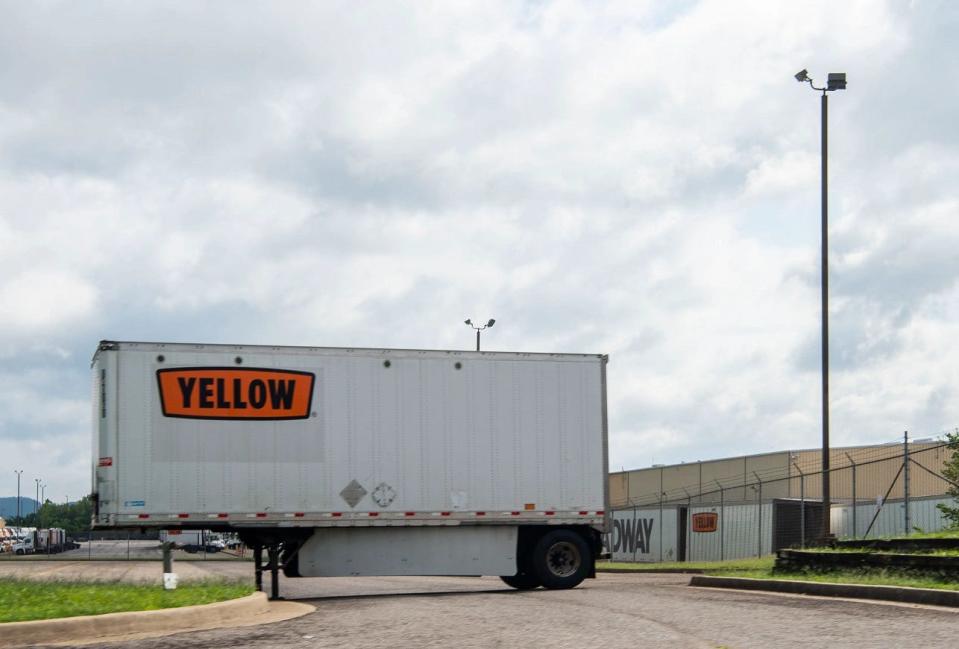Why are so many Tennessee corporations filing for bankruptcy? The answer is surprising.
From his Memphis-based headquarters, Tyrone Clark has endeavored to protect his hauling business during the nation’s stormy economic environment.
But he's still underwater.
This month brought a glimmer of hope. Clark secured Chapter 11 bankruptcy protection, allowing him to reorganize Clark N Son Transportation in the U.S. Bankruptcy Court's Western District of Tennessee. This crucial ruling not only preserves his company's operations but paves the way to emerge from bankruptcy stronger.

“(Since 2020) I’ve been spending what I’ve made all these years to keep the business afloat,” said Clark, who 11 years ago founded his family trucking business.
Other small businesses, as well as major corporations, haven't been so fortunate. Bankruptcies are on the rise in the U.S. after a two-year lull during the COVID-19 pandemic. The Nashville region has experienced a series of major corporate liquidations and reorganizations this year, accompanied by a stream of small business bankruptcy petitions.
In total, Tennessee courts have witnessed nine major corporate bankruptcies this year, according to S&P Global Market Intelligence — compared to five last year and one in 2021.
Some of the corporate bankruptcy filings this year are:
Nashville-based Yellow Corp. also known as YRC Worldwide Inc., was once one of the nation's largest and oldest trucking companies. Now the corporation is fielding bids for its extensive real estate portfolio and fleet of trucks and trailers. YRC filed Chapter 11 bankruptcy in September with $1.2 billion in debt.
Also in September, SmileDirectClub, a direct-to-consumer teledentistry company valued at $9 billion less than five years ago, filed for bankruptcy, hoping to reduce its $900 million debt by attracting a new investor and rejuvenating the company.
American Physician Partners, an emergency-medical services provider in Brentwood, filed for bankruptcy in September with more than $600 million in debt. Like YRC, the company ceased operations, concentrating on selling assets to pay creditors.
Envision Healthcare, a Fortune 500 company worth $5.5 billion in 2018, filed for bankruptcy in May with $7 billion in debt. Last week, the Nashville-based, emergency-physician staffing company announced an agreement with creditors that will wipe out nearly $6 billion of its unpaid loans. Envision will be divided into two entities, according to the announcement — one focused on emergency hospital care and a second servicing outpatient surgery centers.
Corruption precipitated the undoing of Knoxville-based Inmet Mining LLC, a coal company branded as Kopper Glo Mining in Tennessee and Kentucky, in April. The former chief executive officer was indicted by the U.S. Department of Justice last year on suspicion of bribery and money laundering.
Persistently high inflation is the primary reason for the financial reckoning, said Daniel Smith, director of Middle Tennessee State University's Political Economy Research Institute.
"Even small hikes in the interest rate make it difficult for marginally profitable businesses, meaning those businesses that were already struggling to maintain customers, to survive," Smith said. "Businesses have been operating under low inflation and interest rates for a long time now, but they must find ways to adapt their business model to these new circumstances. They must focus on generating value for consumers and cutting costs where possible."
Inflation, which peaked at 9.1% nationwide in June 2022, has slowed progressively as the Federal Reserve progressively raised interest rates to curb the problem. In September, the U.S. consumer-price index rose 3.7%.
But a "slight uptick in inflation" was observed in recent months, Smith said, adding that the Fed does not expect inflation to return to its 2% target until 2026.
Robert Gonzales, a bankruptcy attorney at Nashville-based EmergeLaw, said he's fielding an increase in inquiries from companies with dwindling COVID-19 emergency funds.

Their common gripe? Rising prices for goods and labor.
"Bankruptcy is a vulnerable place to be," Gonzales said. “The goal is that we don’t want the companies to go out of business.
"Every company we’re talking to says they got hit hard by COVID and took loans to stay afloat. Those loans are clouds hanging over the companies, weighing down their balance sheets."
Tennessee bankruptcies: Corruption, mismanagement and cutthroat competition
The Trousdale Foundation, Inc., a group of seven senior living homes that includes Nashville Senior Care, and its debtors filed for protection in U.S. Bankruptcy Court in Nashville in August with $200 million in debt.
The facilities had failed to pay for millions of dollars of therapy services, and its debtors were so distrustful of its management they hired a private investigator to surveil the businesses, according to court records.
"Nashville Senior Care, LLC’s failure to pay Functional Pathways for the therapy services constitutes a breach of the Therapy Services Agreement, which has resulted in damages totaling $433,546.14 through July 20, 2022, including interest at the agreed upon rate," the court complaint states, among other grievances.
The private investigator, who formerly worked for the Federal Bureau of Investigation, and said he watched senior-home employees attempt to secretly shred and throw away bags of business records.
"Mr. Gibson (the private investigator) witnessed an individual leave The Trousdale Foundation, Inc. office, taking four black trash bags to a Dumpster out back of the location," court records state. "After that individual left, Mr. Gibson examined the trash bags, which were the only trash bags in the Dumpster, and found that the contents were shredded documents."
Trousdale Foundation Executive Director Thomas Johnson, who started the company 32 years ago, stated in court documents that it was felled by COVID-19-related financial troubles.
"The debtors were severely impacted by the COVID-19 pandemic that swept across the United States in early 2020," Thomas wrote. "Both operating and labor costs rose dramatically following the onset of the pandemic, which exacerbated negative liquidity impact for the debtors."
Trousdale is now selling off its assets to pay off creditors.
While challenging economic circumstances complicated the business landscape, some companies contended with internal disfunction.
Mismanagement dragged down Yellow after it merged with competitor Roadway in 2003 and USF in 2005, but continued to operate separate networks, severely limiting cost savings just before the 2008 credit crunch and recession hit. Those decisions haunted the low-cost trucker and imperiled its efforts to reorganize. Then, union disputes dragged down momentum to reorganize.
Financial troubles took a variety of forms for stressed Nashville corporations.
SmileDirectClub faced years of contentious lawsuits with dental industry groups and negative media reports that undermined its direct-to-consumer teeth-straightening business. Then, customers dwindled and orders plummeted for the customized retainers during the COVID-19 pandemic and business hasn't recovered.
In Knoxville, former Inmet CEO Charles Hobson, was indicted last year for allegedly bribing Egyptian government officials to obtain $143 million in sales contracts between 2016 and 2020. In return, Hobson received kickbacks via wire transfers and fraudulent contracts.
In April, while Hobson's case moved through federal court, Inmet filed for Chapter 11 bankruptcy protection. The company is now selling off its mining operations.
In March, Memphis-based Burrell Farms and Gardens, a hemp farm and CBD product manufacturer, filed Chapter 11. The company sought a Chapter V rapid restructuring plan, but failed to immediately provide proper documentation of its assets and operations.
As a result, a motion in U.S. Bankruptcy Court in the Western District of Tennessee was made to reclassify it as a Chapter 7 bankruptcy and liquidate all assets. But the company is now working to provide the needed documentation, including proof of insurance and court-mandated operating reports, to remain solvent.
Most companies in bankruptcy in Tennessee will emerge on the other side intact and with a plan for the future, Gonzales said. It's likely the steady stream of Chapter 11 filings will continue while businesses wrestle with COVID-19-era debt, Gonzales added.
Many COVID-19 Emergency Injury Disaster Loans were not secured, allowing companies to get most of the debt wiped out in bankruptcy court.
"If there's no collateral supporting the loan and the company is in a cash-flow crunch, the company can walk away from a bunch of debt," Gonzales said. "The goal is always to get the company back on its feet with as little intervention as possible."
Memphis' Clark: Hoping to get trucks back on the road
In 2019, Clark invested in new dump trucks and other equipment in preparation for growing demand.
Business was good for Clark N Son Transportation and the future looked bright.
Within months, the COVID-19 pandemic turned the financial tide. For Clark, company challenges appeared at every turn.
“The drivers can only do a certain amount of driving because of Department of Transportation regulations," Clark said. "We had to pull our pay rates up to keep driving; then the hauling rate went down. Business has just gone way down."
Clark is focused on a reinvigorated future, although his core customers — contractors — continue to reduce delivery requests because of the high cost of building supplies.
Said Clark: "I think this reconstruction process will put me in a better place.”
Sandy Mazza can be reached via email at smazza@tennessean.com, by calling 615-726-5962, or on Twitter @SandyMazzza.
This article originally appeared on Nashville Tennessean: Tenn. corporate bankruptcies up 80% as COVID-era support phases out

